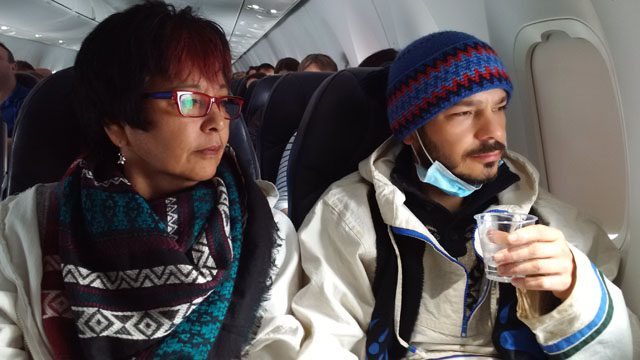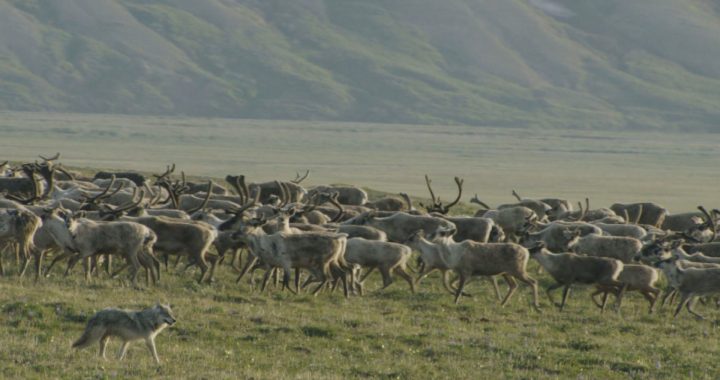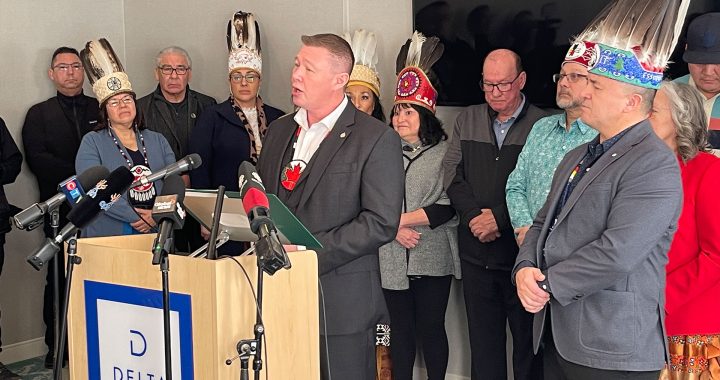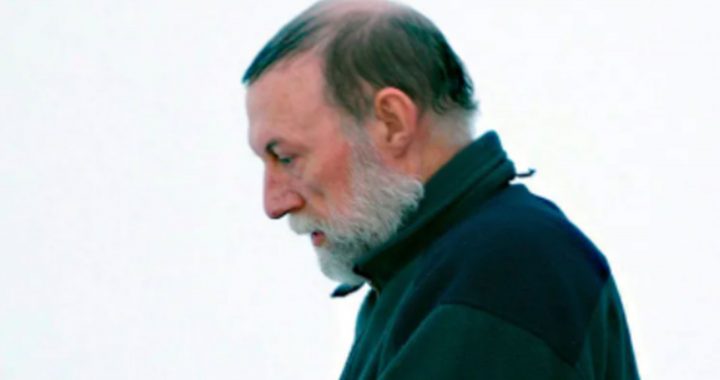(“When the bigger power is doing the wrong thing, the people that stand up to it are not extremists, they’re not suicidal. We are land protectors.” Billy Gauthier. Photo: Tom Fennario/APTN)
Tom Fennario
APTN National News
Across the road from the entrance to the Muskrat Falls construction site entrance, at the Muskrat Falls protest camp, there an old 1980’s motorhome powered by a generator.
I walk up to the front door and knock gingerly before opening.
Billy Gauthier sees me and springs out of the bunk above the driver’s chair.
“Oh yeah, the interview, let me get ready!”
On October 13, Gauthier was known as an Inuk sculpture who’s carvings sell for thousands of dollars. But that was before he decided to stop eating in order to protest the Muskrat Falls hydroelectric project.
Now he’s become the face of the #MakeMuskratRight movement.
“I’ve been so worried for so long, but like so many others I thought that I didn’t have a voice, and I asked myself what could I possibly do?” Gauthier said sitting at one of the bench seats inside the motorhome. “And the best thing that I can think of, to make big change, was a hunger strike”.
I’m visiting Gauthier on day eight of his fast. As he pours himself a cup of hot water, his face is briefly engulfed with steam when he takes a sip.

It looks more gaunt than the one that appears in the photos on the “Support Billy” posters strewn all over camp.
“I’m drinking…tea. No, It’s not really tea it’s actually water,” said Gauthier “But if I convince myself it is I almost feel the taste. I’m an artist, so it’s easy, I got a big imagination.”
Gauthier pauses to take another sip.
“I had a lot of practice being a starving artist in the past.”
Gallows humour helps Gauthiers, 38, get through the days that are becoming shorter with winter coming on. He said he’s lost 17 lbs (eight kilograms) so far, but that his well being is less important than that of land he wants to protect.
“The land, the waters are our mother. And we won’t let anyone harm our mother.”
The $11.4 billion Muskrat Falls project aims to provide over 800 megawatts of renewable energy to the island of Newfoundland to the south.
But the provincially owned Nalcor needs to flood a large area of land along the Churchill River to make it a reality.
Initial Nalcor studies showed there would be minimal impact to fish and wildlife, but a study conducted by a Harvard University researcher told a different story.
Dr. Elsie Sunderland ‘s study raised concerns about methylmercury, a neurotoxin, that would seep from the vegetation and topsoil into the water if the planned flooding of an area along the Churchill River occured, thereby poisoning Inuit and Innu country food, such as fish and other wildlife downstream.
Nalcor needs to flood the area before November to protect their investment, so the project is getting close to a do or die situation.
But so is Billy Gauthier. With every passing day, the dispute becomes an increasingly higher stakes game of chicken.

Gauthier said he isn’t suicidal, yet he also said he’s willing to die.
With the high rate of suicide among Inuit, does he worry about being a role model for others to follow?
“Well, I’m not doing this to be a role model,” he said. “People always like to point fingers and say that whenever anybody stands up against bigger powers, that they’re extremists. But you know what, when the bigger power is doing the wrong thing, the people that stand up to it are not extremists, they’re not suicidal. We are land protectors.”
Gauthier shares the motorhome with two other Inuit who joined him on the hunger strike. On the day that I’m there, Delilah Saunders and Jerry Kohlmeister have not eaten in five days, although they are consuming broth.
They say like Billy, they’re ready to die.
“If it don’t work than, I guess me and two fellow strikers will be, sad to say, six feet under the ground. With pride,” said Kohlmeister, 24, a father of a two year old girl.
“I’m afraid of dying. But I know that I’m more afraid of the poison that will affect my children, my grand children, my nieces, my nephews,” said Saunders.
Everyone is waiting on word on whether they’ll be taking their hunger strike to Ottawa.
Crowdfunding has come through, and travel arrangements are under way.
“I do believe in the power of numbers and the power of making your voice heard on the political stage because I’ve seen what it’s done for the national inquiry into missing and murdered Indigenous women,” said Saunders, who’s sister Loretta was murdered in Halifax in 2014.
Sure enough, one hour later the word comes in. The flights are booked, on Saturday they go to the nation’s capital.

It’s day nine of Billy Gauthier’s hunger strike. He along with Delilah Saunders and Jerry Kohlmeister disembark in Halifax on their way to Ottawa. Billy’s mother Mitzi is also accompanying them.
Gauthier’s mother Mitzi is also accompanying them.
“I believe wholeheartedly in the cause, I believe that Muskrat has to stop, but I do not believe in those guys not eating,” said Mitzi. “ I’m not leaving Billy’s side right now, but for the love of god, somebody do something.”
Billy sits down at his gate. His eyes are glassy and he looks worse than when I saw him back at the camp the day before.
He has brought with him a bottle of Churchill River water to present as a gift to Algonquin who will be welcoming him to their territory at a demonstration on Sunday.
I ask him what he’ll do if Nalcor floods the land before he can return back home on Tuesday.
“Then they’re going to have to reverse. And if they don’t reverse, or stop it, then I continue on with my hunger strike, and it will be stopped,” he said.
His unwavering confidence comes across as genuine. I thank Billy for his time and glance at his mother’s face as I make my way towards my own flight.
She doesn’t seem so certain.











